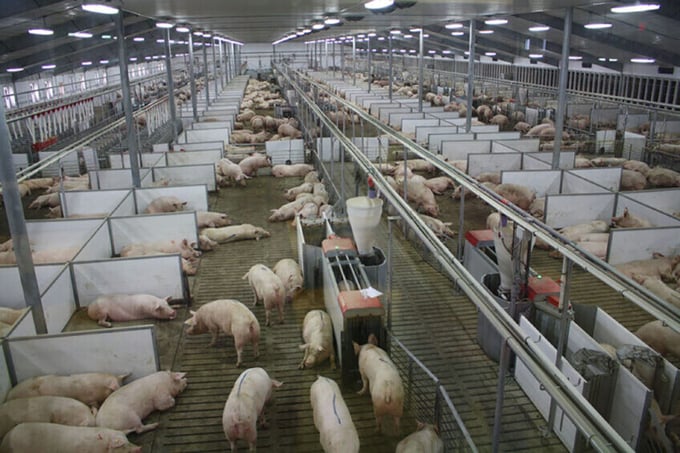November 24, 2025 | 19:10 GMT +7
November 24, 2025 | 19:10 GMT +7
Hotline: 0913.378.918
November 24, 2025 | 19:10 GMT +7
Hotline: 0913.378.918

Group housed sows at a farm in Indiana. Photo: Vincent ter Beek
Proposition 12 is a California state law from 2018, also known as the “farm animal confinement initiative.” It will take effect on January 1, 2024. It requires that pork meat sold within the state of California, the largest US state market for pork, must meet certain sow housing requirements related to freedom of movement and larger floor space per pig.
In addition, in 2016, the state of Massachusetts passed Question 3 (Q3), which is similar to Prop 12. However, it goes further in that it prevents the shipment of non-compliant pork through the state, affecting several state markets.
The Supreme Court upheld Prop 12 in May 2023. Now, to counteract this, 2 Republican senators introduced a piece of legislation called “The Ending Agricultural Trade Suppression Act” (which technically is a bill until approved by Congress, ed.). The act is supported by the National Pork Producers Council (NPPC) and the American Farm Bureau Federation, as well as almost 3 dozen co-sponsors in the US House of Representatives and 13 senators (besides the 2 who introduced it in the US Senate).
However, a letter against the act has been signed by other Republican legislators. They state that the act, “as applied in this circumstance, it is at odds with our foundational Republican principles of states’ rights, national sovereignty and fair competition.”
This group is concerned that the act would provide WH Group, a Chinese company that owns the largest US pork producer Smithfield Foods, “with a mechanism to bypass state-level laws and rapidly acquire even more American land and pork industry assets with no restraints at all.”
There are those, such as Dr Monique Pairis-Garcia (associate professor, veterinarian at North Carolina State University and columnist at Pig Progress), who believe the US industry can manage to find ways to comply with newly-introduced standards. However, others at the World Pork Congress were of the opposite view. Michael Formica, NPPC chief legal strategist, stated that Prop 12 is “catastrophic for farmers in Iowa” and “also for consumers in California” due to increased pork prices in that state.
Dr Steve Meyer, an agricultural economist at Kerns and Associates, explained further that because non-compliant pork will no longer be able to be sold in California next year, it will be introduced into other US states, leading to an oversupply outside California. He noted that “the price of pork will have to drop 10-15% cutoff value per hundredweight, and prices are already low.”
However, about 2 years ago, 2 of the largest US pork companies, Tyson Foods and Hormel have already agreed to comply with Prop 12. Canadian pork is also sold in the US, and major Canadian integrated pork producer Maple Leaf Foods has already transitioned to open housing for gestating sows. Quebec-based duBreton produces a line of ‘humane-certified’ pork that complies with Prop 12. In addition, several farm equipment companies are producing Prop-12 compliant housing options.
(PP)

(VAN) Brazil's COP30 presidency pushed through a compromise climate deal on Saturday that would boost finance for poor nations coping with global warming but that omitted any mention of the fossil fuels driving it.

(VAN) Poultry farmers in the UK have been warned that they could face one of the worst winters yet for bird flu.

(VAN) Prices of main-crop paddy have risen sharply, with jasmine rice hitting 16,100 baht per tonne — the highest level in years.

(VAN) In Brazil, FAO unveiled a series of reports and initiatives showing how sustainable agrifood systems are a solution to the climate crisis.

(VAN) With names like neodymium and dysprosium, rare-earth elements sound exotic — and their perceived scarcity has only added to the mystique.

(VAN) In a new study published in Trends in Biotechnology, researchers used a gene-editing technology called CRISPR to increase a fungus's production efficiency and cut its production-related environmental impact by as much as 61%- all without adding any foreign DNA.

(VAN) A top official in Beijing’s Cop delegation says China is committed to clean energy – but US’s absence is a problem.